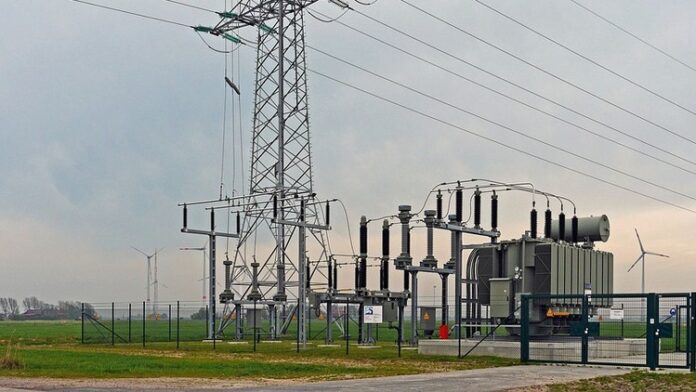The Federal Government says it plans to electrify rural communities with N2.3 trillion under the Economic Sustainability Plan (ESP) being coordinated by the Office of the Vice President.
Mr Goddy Jedy-Agba, the Minister of State for Power said this in Abuja on Tuesday, while inaugurating the First 12 Kilo Watts Peak (KWP) Volus Solar for Health (VSFH) Mini-Grid with58 KWH Battery Bank at Karu Primary Health Centre initiated by Volus Energy Ltd.
The event was also used to unveil the Sustainable Energy Africa Magazine.
Jedy-Agba said that the project would provide Solar Home Systems (SHS) to five million homes across un-served rural communities in Nigeria.
According to him, government is promoting a holistic development agenda and will continue to provide power for under-served communities in Nigeria.
The minister said the provision of electricity to the rural communities would encourage people who live outside the towns and cities to engage in small businesses and preserve farm produce by processing them.
“This is because if you grow these communities, then businesses will spring up, the health sector will perform better, and you know what the result is – improved living conditions. It is in this light that the Office of the Minister of State for Power at the Ministry of Power supported Volsus Energy Ltd., a solar and renewable energy start-up firm toward flagging off this project. At this period when Nigeria is battling to flatten the COVID-19 transmission curve and to completely eradicate it, the Federal Government is supporting critical initiatives toward these goals. Reliable power supply is essential across health facilities to increase their work pace”.
The minister said Primary Health Centres (PHCs) were critical facilities in rural communities as they were the first sign of government’s effort in providing sustainable health to its people.
He said over the years, adequate power supply to the centres had been one of the challenges the facilities have faced across the states.
“I was informed that at a time, this Karu primary health centre had to suspend night shift because of the epileptic power supply and the challenges that come with that. I believe that this is now a thing of the past with the commissioning of this first VSFH 12 kilowatt power (KWP) solar mini-grid with 58 kilowatt hour (KWH) battery bank”.
Jedy-Agba said President Muhammadu Buhari’s administration was also promoting the mini grid regulation made by the Nigerian Electricity Regulatory Commission (NERC) through the Rural Electrification Agency (REA).
He said that several mini-grid projects had been commissioned and more were underway under the mini grade regulation.
“Through mini-grids projects, REA aims to provide clean, safe, reliable and affordable electricity to 300,000 homes and 30,000 local businesses.
“ REA is supporting private developers through performance based grants with support from development partners including the World Bank and the African Development Bank (AfDB).
“This is to provide mini-grids and solar home systems across communities toward achieving the access to energy Goal 7 of the Sustainable Energy Goal (SDGs).
Earlier, Mr Tomiwa Bayo-Ojo, the Chief Executive Officer (CEO), Volsus Energy Ltd.’ said that the facility was conceived towards improving Nigeria’s health system, while deepening the fight against the COVID-19 pandemic.
Bayo-Ojo said that Volsus had continually observed the focal drive of this administration, especially in promoting rural and community based electrification as a means of boosting access to electricity in underserved and unserved places in Nigeria.
According to him, while the government is investing hugely in ensuring more access to electricity, private investors can support this drive by playing a critical role to complement this effort.
“In the renewable energy subsector of the power sector, there is little or no presence of independent investment that is heralded by the private sector to promote solar and other renewable energy penetration across Nigeria. Deeply concerned about this, and considering the state of the nation’s health facilities, amidst the ravaging COVID-19 pandemic, Volsus Energy Ltd., a foremost indigenous renewable energy and inverter producing start-up firm, initiated the Volsus Solar For Health (VSFH) programme. With the vision to promote the attainment of Goal 7 of the Sustainable Development Goals (SDGs) toward creating ripple effects on the living conditions of millions of Nigerians who seek access to health facilities”.
Bayo Ojo said Volsus Energy was providing access to sustainable and uninterrupted electricity by deploying state-of-art solar power facilities across Primary Healthcare Centres (PHCs) nationwide.
He said the components of the Karu mini-grid facility consist of arrays of solar panels that could generate up to 12KWP energy with the battery bank capable of providing 24 hours electricity and could last for 58 hours at its maximum load point without sunshine. What this means is that even if there is no sunshine for more than two days, the facility will still power the health centre. The mini grid is now providing 24 hour electricity to the wards, the labour room, the laboratory and the entire building. There is also the component for a refrigerator to improve the storage process of vaccines for routine immunisation at the centre”.
Bayo-Ojo said Volus had also provided fans and cooling systems to improve the productivity and safety of the healthcare workers at this very delicate time and the pilot mini grid project was fully funded by Volsus Energy Ltd. with technical and advisory support from the Office of the Minister of State for Power.
FG to Electrify Rural Communities With N2.3trn Under ESP
- Advertisement -
- Advertisement -
- Advertisement -
- Advertisement -
- Advertisement -

